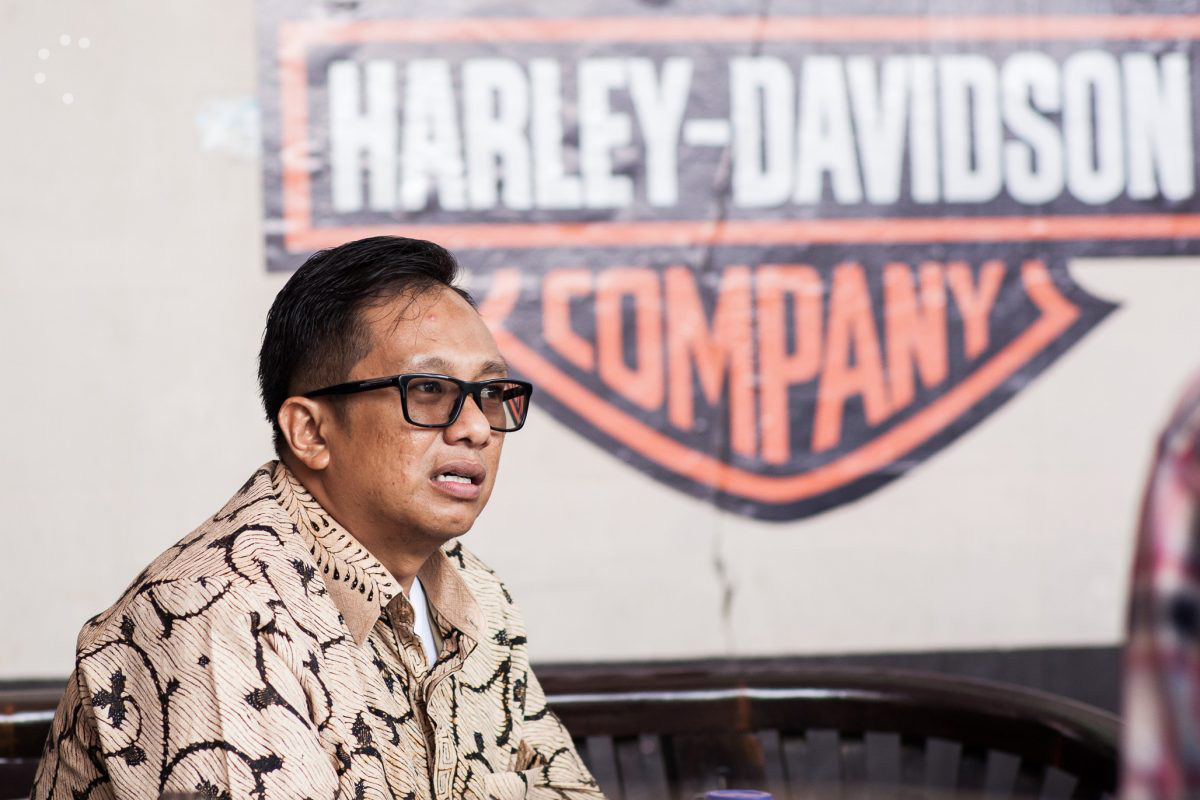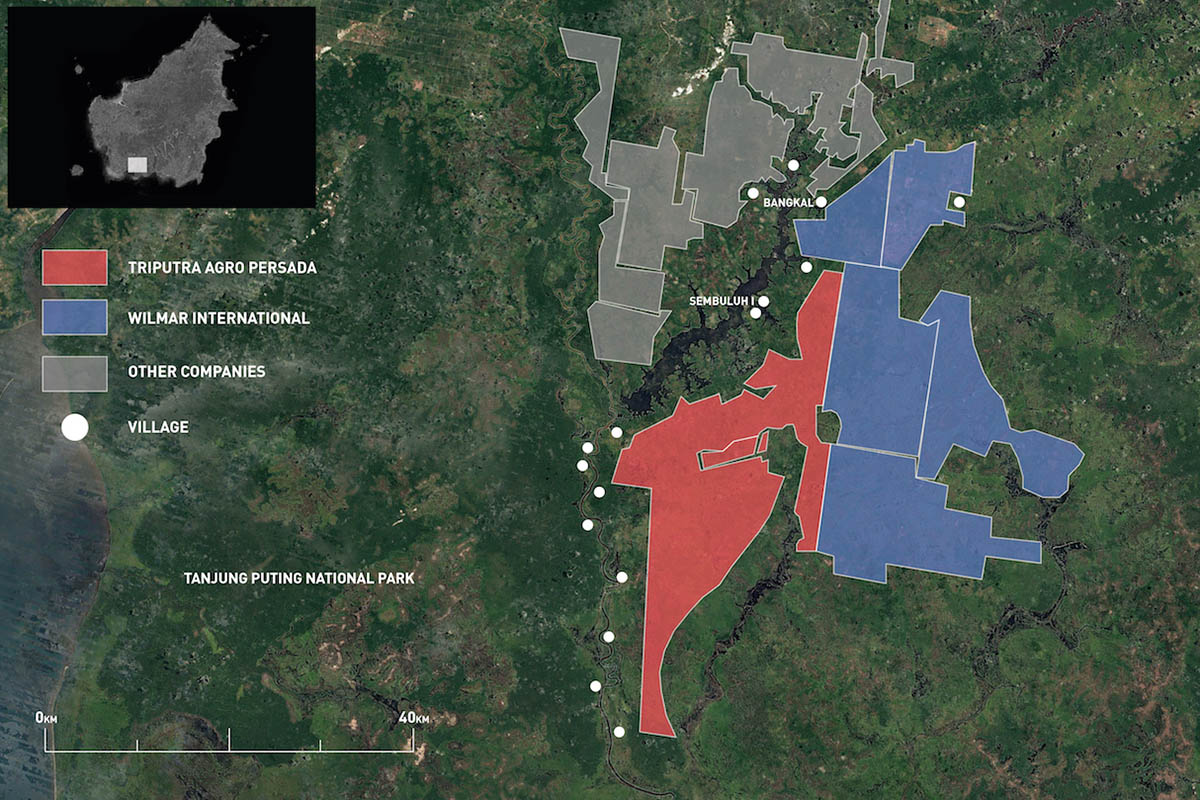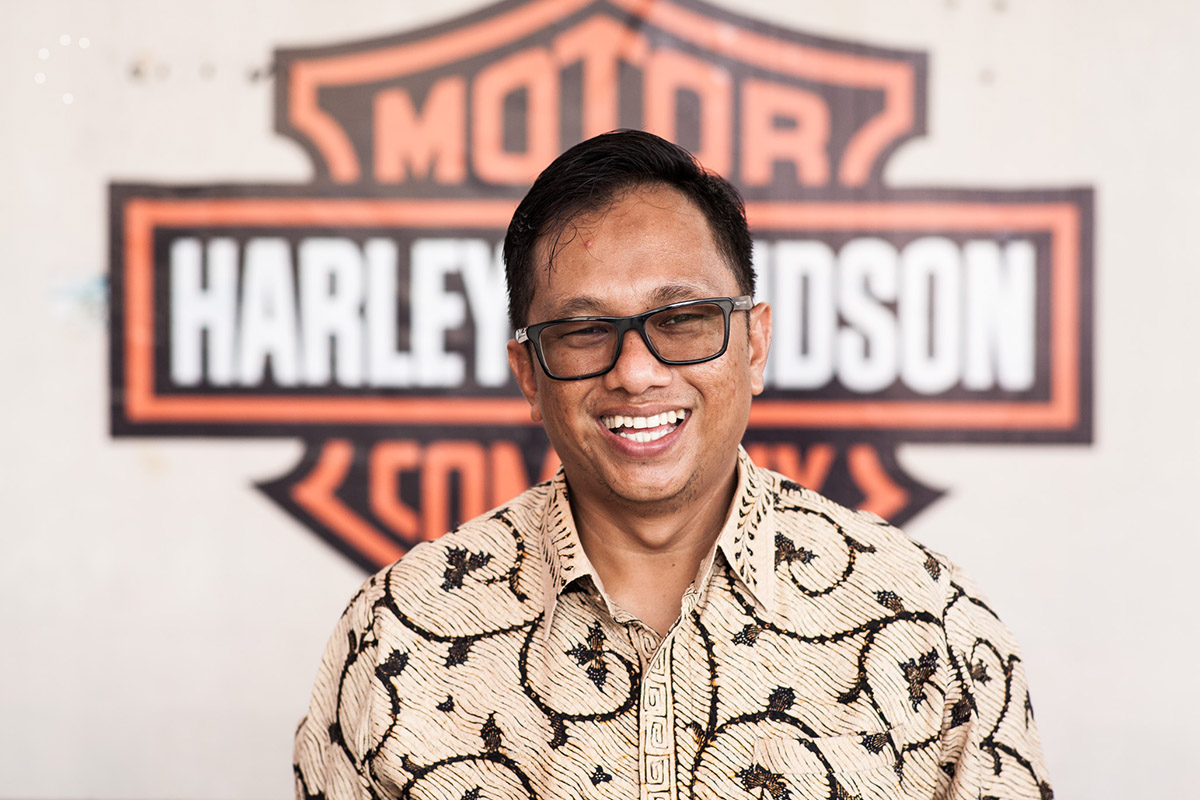Despite his son’s defeat in the 2013 election, Darwan’s family remained embedded in the political establishment in both Seruyan and Central Kalimantan province. Darwan moved to a new political party, which he now chairs at the provincial level. It is an influential position for trading support in elections. Last year, he used it to back the current governor, the nephew of a timber baron who plundered Tanjung Puting National Park, for a second term.
Darwan did not respond to multiple interview requests, delivered via text messages and calls to a number provided by his party’s office at the House of Representatives in Jakarta. At one point, he answered the phone, and promised to text us his email address so that we could send him our questions, but he never followed up. Neither did he reply to a letter outlining our findings and including a series of detailed questions, delivered to his party’s headquarters in Central Kalimantan.
However, on an afternoon in April this year, we tracked down his son Ruswandi to a sprawling house in Sampit where he spends his weekends. Members of the family occupy various positions of power in the district and province. Ruswandi’s consolation prize after losing the race for bupati was to replace his cousin as head of Seruyan’s parliament.
We met him in the courtyard of the low-slung house, behind a white gate manned by a guard, on a set of wooden benches in the shade. Flanking us were a pair of custom off-road vehicles emblazoned with the Harley Davidson logo. In the garage sat another four-by-four, a gift from his father. Ruswandi grinned as he peppered his nasal speech with jargon-derived English-isms, such as “efektif efisien”. Small and pudgy, he wore black-rimmed glasses, but forsook the peci cap he was often photographed with.
He was in good spirits, uninhibited by the social crisis that faced his district, in which he was now perhaps the second-most influential politician. In fact, it was not a crisis he recognised, as in his view the shift to plantations had benefited Seruyan. “If there wasn’t oil palm, nobody would know what to do, because the natural resources are all gone,” he said. “That’s why as I see it, things are pretty good.”

Ahmad Ruswandi at his home in Sampit.
He acknowledged that there had been “pluses and minuses” to the rapid spread of plantations, but the solitary downside he could identify was that the district’s waterways were “not like before”. Nonetheless, he exonerated the companies surrounding Lake Sembuluh from driving its pollution. His novel explanation was that the people “bathe and poop in it”. “If there weren’t any companies, the lake would still be dirty,” he said.
“If there wasn’t oil palm, nobody would know what to do, because the natural resources are all gone. That’s why as I see it, things are pretty good.”
At first, he claimed that the palm oil industry had provided jobs for locals. Then he switched tack and claimed that the problem was that locals did not want to work in the plantations. In the era of logging, they had been accustomed to easy money from timber. Now they were “spoiled”, while migrant labourers were more “qualified” for what he called “the system of harsh living”.
With some prompting, he admitted that it would be difficult for communities to benefit from the plantations in the absence of smallholdings. “Hopefully there will be smallholdings,” he said. “Because it’s a pity for the people.” But he was not brimming with ideas for how to make it happen. One parliament member we had met, from a rival party, had been adamant that the government should threaten to revoke the permits of companies that withheld smallholdings. The best Ruswandi could offer were platitudes about “synergy”.
Ruswandi openly admitted that he himself had owned three companies sold to Triputra, the ones it had gone on to develop. When the subject was brought up, he named the subsidiaries unprompted. But he spun a false narrative in an effort to dissociate his family from the web of corruption they had created. He claimed that the companies were formed before his father took office, and that Darwan had never given them licenses.
Company documents and a government permit database show this to be a lie. But Ruswandi reached for it quickly. He was keen to create the idea that he had drawn a red line between his own role as a public official and business, a line that had in fact become irredeemably blurred by his family’s permit trading.
“As a representative of the people, I’m like a referee,” he explained with a large smile. “If I’m the referee, and I play too, that’s not fair. So I do business outside Seruyan. In Seruyan, I have no businesses. I’m purely a representative of the people.”
He insisted that all of the licenses issued by his father were clean. As evidence, he cited the fact that he had never been caught.
“If they weren’t clean, they’d have been flagged by law enforcement, right?”
Earlier this year, news reports indicated that Triputra had begun to distribute smallholdings in some communities that had waited years for them. Sudarsono, the current bupati, spoke at a handover ceremony in Baung village. “I know just how long the people have been fighting for their smallholdings, and now that struggle is finally bearing fruit,” he said at the event. “The people should be proud and grateful.” A pack of government officials gave a thumbs-up for the camera. In tow was Ahmad Ruswandi, in his capacity as head of Seruyan’s parliament.
Baung lies on the Seruyan River, which squeezes through a narrow strip of land between Triputra’s gargantuan estates and a protected area on the fringes of Tanjung Puting National Park. The plantations leave the village with a few hundred meters of land east of the river; the west is off limits.
On a hot and dusty evening, we sat down with Damun, a member of the village government. He painted a bleak picture of life in the plantation era. Locals could no longer harvest timber without being arrested for illegal logging. Fisheries had collapsed with the fouling of rivers. Much of their farmland had been ceded to the companies. The best jobs at the firms went to outsiders seen as more capable, while the pitiful rates paid to unskilled labourers were barely enough to survive. Still, he told us, “The people here all depend on the plantations”. They were the only game in town.
Three years earlier, residents of Baung and other villages blockaded the road into one of Triputra’s concessions, demanding that it resolve decade-old land grabs. Now Damun felt they were finally on the cusp of getting a piece of the oil palm pie. Triputra had earmarked some 3,000 hectares of smallholdings in four villages.
“We’ve been waiting for seven years. This is our last hope. God willing, the company can help us.”
But Sudarsono’s announcement had been somewhat premature. Most of the land the firm had slated for the communities lay in areas in which the forestry ministry did not allow plantations. The reality of Triputra’s photo opportunity was that the smallholdings were still stalled. Only a tiny portion had been planted.
“We’ve been waiting for seven years,” Damun implored us. “This is our last hope. God willing, the company can help us.”
As the farmers of Seruyan await their smallholdings, Arif Rachmat, CEO of Triputra Agro Persada, promotes an image of his company that increasingly diverges from reality. He trumpets himself as a dynamic and progressive young tycoon. In January he travelled to Davos, Switzerland, for the World Economic Forum, where he was chosen as a Young Global Leader, joining a community of high achievers that describes itself as “the voice for the future and the hopes of the next generation.” Dressed in a winter coat, he told a TV crew, “One of my passions is about improving farmers’ productivity and livelihoods as well as food sustainability.”
One of Arif’s subordinates told us in an email that Triputra adheres to regulations requiring companies to provide smallholdings equivalent to a fifth of their plantations. This is not true in Seruyan, and there is evidence that the social unrest caused by the company spreads across its land bank, into other districts in Kalimantan.
Today, oil palm covers more than a fifth of Seruyan’s land. Ninety-six percent of it is owned by the super-rich, including the Kuok, Rachmat, Tjajadi and Widjaja families. Profits flow out to the capitals of Jakarta, Singapore and Kuala Lumpur. Only a fraction of the taxes collected by the state find their way back to Seruyan.
“We’ve been waiting for seven years. This is our last hope. God willing, the company can help us.”
The oil palm is concentrated in the district’s southern half, where most of its people also live. Villagers’ access to land is tightly constrained by the mega-plantations. Lake Sembuluh and its waterfront villages are almost fully encircled. Its southern banks are claimed entirely by Triputra, whose estates also extend down along the Seruyan River, hemming in the villages dotted along it.

Oil palm plantations encircle Lake Sembuluh and the villages on its shores.
In a written response to questions for this article, Wilmar told us it was trying to provide smallholdings in Seruyan and had succeeded in some areas. But it also said its efforts had stalled because there was no land left. This is what has become of a vision of private sector-led development that would somehow benefit the poor.
Sudarsono, the great hope for Seruyan, has earned the quiet disappointment of those who fought for his victory in the polls, and who remain excluded from the palm oil riches. But he has succeeded in promoting Seruyan as a pilot for a new idea floated in the world of corporate sustainability, branded “jurisdictional certification”.
After two decades of land rights abuses and plantation-driven deforestation, the proposal is that all palm oil from the district will be declared “sustainable”. Seruyan would serve, as one official put it, as “a model for other districts, not only in Central Kalimantan but also in Indonesia, for sustainable palm oil development.” Consumer goods giant Unilever, the world’s largest palm oil user, would preferentially source from the district.
Sudarsono told a gathering of palm oil firms and NGOs, in 2015, that when companies sourced from Seruyan, they could be certain they were buying palm oil produced “without causing deforestation”. He added: “They will also know that there was no burning when clearing land or seizures of indigenous lands.”
The programme includes some progressive ideas, such as ensuring smallholders have a route to market, and resolving land conflicts. But for now, it is mostly carrot, and very little stick. Seruyan’s palm oil firms are offered a path to redemption but do not have to face the consequences of previous wrongdoing.
The idea reflects a desire among corporate executives and some politicians to draw a line under the past and treat the present as day zero in a new era of sustainability. The sins of yesterday are forgotten, and plantations on land that was forest a few years ago can be deemed “sustainable”. In response to our questions, for example, Wilmar spokesperson Iris Chan said the company should be judged on what it does today. “We do not believe that raising issues from more than ten years ago is meaningful”, she wrote.
The problem for the people of Seruyan is that they are stuck with the legacy of decisions made a decade ago. But the notion that actions taken then are inviolable is not shared by the KPK. The anti-graft agency is pioneering a more proactive approach to corruption in the sector, examining the legal compliance of plantation companies across the country. A similar focus on the mining sector, which began in 2014, yielded the cancellation of hundreds of licenses.
The potential for such an approach is limited in Seruyan, since the land has long since been cleared and planted. But large numbers of latent and as-yet unexploited licenses hang over forests and indigenous lands throughout Indonesia, especially on the islands east of Borneo, where the industry is quickly expanding. Little scrutiny has been applied to the circumstances in which they were issued. A growing body of evidence — including forthcoming stories in the Indonesia for Sale series — suggests that a seething mass of collusion lies beneath most of these paper permits. In those cases, revocation could prevent the orgy of destruction and exploitation from occurring in the first place.
But while it might provide a respite for Indonesia’s forests, solely revoking existing licenses will not solve the problem. The lesson of Seruyan, and the model it represents for other districts, is how much damage can occur when government officials are allowed to act in a vacuum of accountability and scrutiny. The shadow system that allowed Darwan Ali to flourish remains unchanged. There has been little effort to break the link between money and politics. It is this link that allows bupatis to bankroll elections and inflict harm on the people they are elected to serve, in favour of lining their own pockets.
The shadow system that allowed Darwan Ali to flourish remains unchanged.
The game goes on in frontier districts across the archipelago. There are indications that the lessons of Seruyan are already being applied elsewhere, though not for good. Khaeruddin Hamdat, Darwan’s right-hand man, has reappeared in Donggala, a heavily forested district on the island of Sulawesi, just east of Borneo, where conflicts between people and oil palm companies are just now emerging. Facebook photos show him poring over a concession map and dining with the bupati, who will stand for re-election next year.
In June 2018, more than 100 districts will return to the polls to elect new, or perhaps incumbent, bupatis. Among them is Seruyan. Darwan’s daughter, Iswanti, will be the next of the family to pitch for its top position. She registered as a candidate in May.
“As a ‘daughter of the soil’,” she told reporters, “I feel called to serve and develop Seruyan.” – The end.
Photos by Leo Plunkett, Sandy Watt, Tom Johnson and Sam Lawson. All other illustrations by Sophie Standing.
This article was curated jointly by the environmental news website Mongabay and The Gecko Project, an investigative journalism initiative established by Earthsight. The article is part of an investigative series entitled Indonesia for Sale.
Recommended stories:
